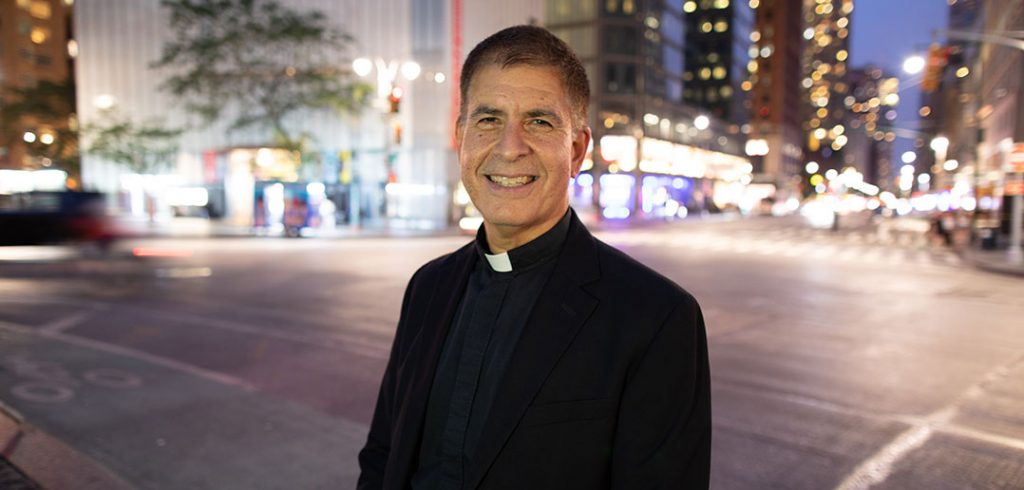Q: Seven years ago you left your position as rector at Fordham to take over leadership of the newly combined USA Northeast Province of the Society of Jesus. What did you learn from your time that you’ll be bringing back to the University?
A: A large part of bringing together the New York and the New England provinces was to focus on the core features that united us. The different missions are all rooted in a common appreciation of how God labors in the world and through each of us, and our response is one of gratitude, love, and generosity.
Having been at Fordham for 15 years, I have a special interest in Jesuit higher education. What is unique about Jesuit higher education is that same spiritual foundation we’re focused on in the province. We’re in the business of not only preparing people for careers, but also informing how they see the world, how they orient themselves toward God and other people. No matter what profession they pursue, they put those gifts at the service of others, and especially the poor, the marginalized, and those members of society who are ignored or overlooked.
I think sometimes we forget to articulate that we’re not here only to introduce people to great ideas, but also to make them “men and women with and for others.” My role is to work with others in the University to keep our focus on why we are engaged in the business of Jesuit education here.
Q: What will be some of your biggest priorities?
A: One of my biggest priorities is working with the Board of Trustees. In 2013, I was asked to coordinate a meeting of the board chairs of 28 Jesuit colleges and universities with Father General Adolfo Nicolás, S.J. He said to them, ‘You are the leaders of the colleges and universities.’ In a legal sense, that’s absolutely true, but it’s also true in a mission sense. The board allocates finances and makes decisions that help people like me and others with overseeing and implementing the mission.
Another is faculty. I was a full-time member of the faculty for 15 years, so I know that faculty are very busy. The challenge is to help faculty have some time to reflect on that key question, ‘Why am I doing this in the context of a Jesuit university?’ That’s going to be through a series of talks and presentations, and through personal reflection and exploration. I’m working closely with Jim McCartin in creating initiatives that will include seminars and retreats.
We also want to expand the work that Lito Salazar, S.J., and campus ministry does. We want to serve the Catholic students and those who are interested in explicit religious practices, but there are others who I’m sure would benefit from programs designed to open them up to a spiritual worldview.
We also have the Center for Community Engaged Learning, which Dr. Julie Gafney just took over last year. They’ve increased the number of courses that are offered where faculty engage with students who participate in community engagement projects and integrate that work with academic work. It’s a wonderful opportunity to be of service to the poor and marginalized right here in the Bronx community.
David Gibson has been doing some wonderful talks, discussions, lectures, and seminars with the Center on Religion and Culture. I’m going to be working with him to expand that programming to include topics that would be of particular interest to younger people.
Q: Talk to me about life trap theory, which is your area of expertise in psychology. Is that going to play a part in how you approach your new role?
A: What gets in the way of productively focusing on mission are our personal, and you might say institutional, life traps. One of the life traps is overdependence. So for example, students or faculty might say, ‘Well, mission is the work of others and, I’ll let them do it.’ That’s kind of a trap because it’s shirking a responsibility that is really incumbent on all of us to participate in.
Q: This year is the Ignatian Year, which celebrates the 500th anniversary of the “cannonball moment” of St. Ignatius, the founder of the Jesuits. Why is Jesuit spirituality so important even after five centuries?
A: It was May 20 of this year that was the 500th anniversary of St. Ignatius being hit by a cannonball when he was a soldier. It was a turning point in his life because that wound literally laid him on his back, and during his convalescence, he started to read Lives of the Saints and started to think, ‘Maybe this whole ambition of worldly success is not that important—what’s really important is following Jesus Christ.’
What you might call the “cannonball moment” is what Jesuit education is all about. We’re not going to shoot students with cannonballs, but hopefully in the course of their time in a Jesuit school, their worldview gets shaken, maybe shattered, certainly rocked, and they get opportunities to radically rethink who they are, what they are, and what their purpose in life is, just as Ignatius did. So this year, we’re celebrating a focus on conversion and higher education. That’s the core mission.
Q: Does it feel more relevant given what a tumultuous time this is?
A: Pope Francis [who is a Jesuit]had something to say about that. He did a series of interviews recently and they were published in a book called Let Us Dream (Simon & Schuster, 2020). He says the pandemic is just like the cannonball for the whole world, and he hopes that the new normal will be a more radically transformed world, where we come out of it with a heightened awareness of the needs of others. He sees it as a fertile, if extraordinarily painful, moment for us.

